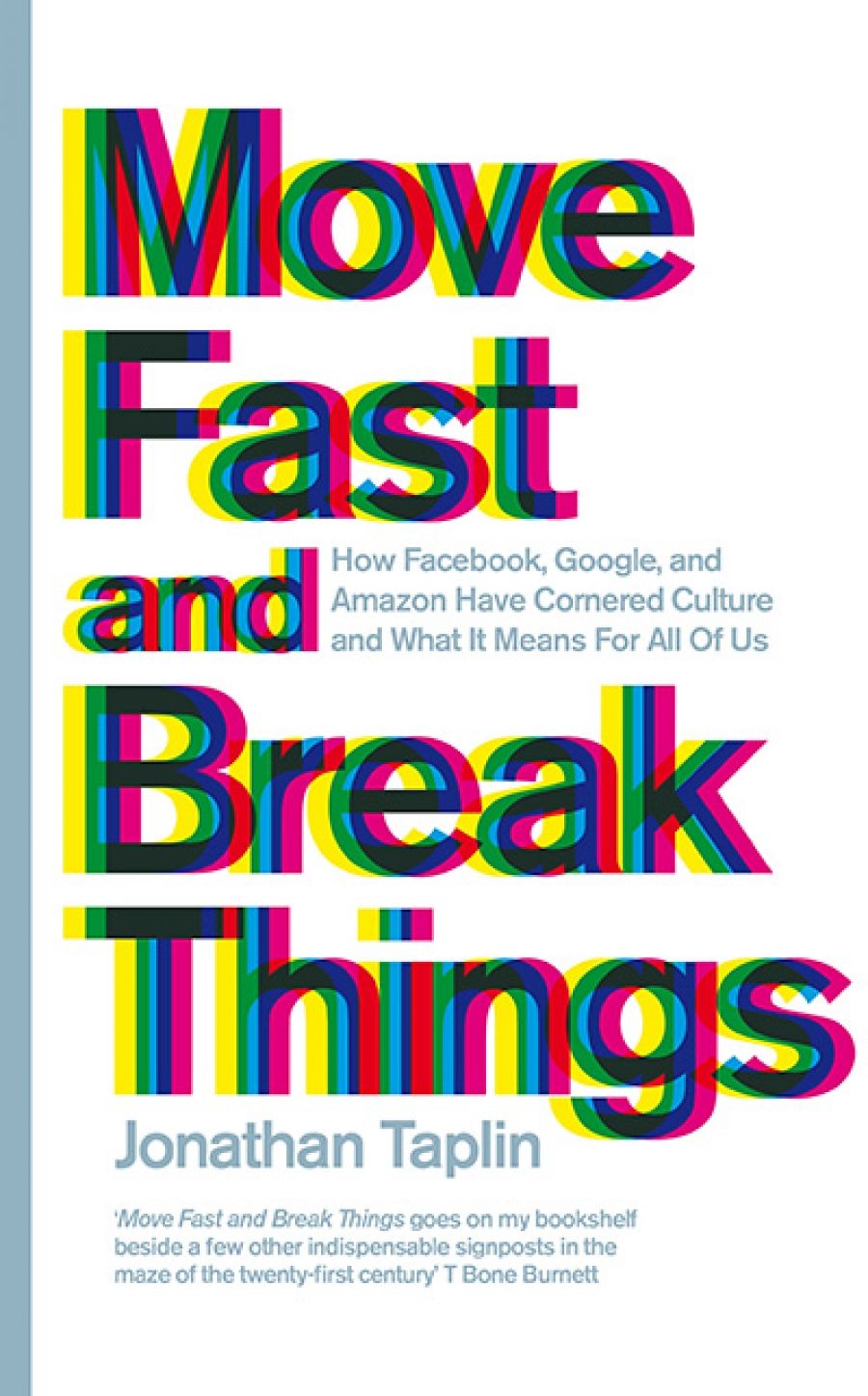
- Free Article: No
- Contents Category: Society
- Custom Article Title: Joel Deane reviews 'Move Fast and Break Things: How Facebook, Google, and Amazon cornered culture and undermined democracy' by Jonathan Taplin
- Review Article: Yes
- Online Only: No
- Custom Highlight Text:
Good books are like recurrent dreams: haunting the reader’s waking hours by sitting, tantalisingly, on the edge of conscious thought. Take, for example ...
- Book 1 Title: Move Fast and Break Things
- Book 1 Subtitle: How Facebook, Google, and Amazon cornered culture and undermined democracy
- Book 1 Biblio: Macmillan, $39.99 pb, 286 pp, 9781509847723
Reading Jonathan Taplin’s Move Fast and Break Things made me realise why The Big Con was on my mind. I had come to suspect that a convergence of forces – from the global economy to next-generation technology to local democracy – were all part of the biggest con; that our society was being cheated of its equality, privacy, and independence by its own appetite for cheap T-shirts, iPhones, and populism; and that the larceny in our collective veins manifested as convenience, consumerism and cynicism.
Consequently, my non-fiction reading tends to favour naysayers such as futurist Jaron Lanier (‘digital network architectures naturally incubate monopolies’), historian Tony Judt (‘we have entered an age of insecurity – economic insecurity, physical insecurity, political insecurity’), economist Joel Mokyr (‘economic change in all periods depends, more than most economists think, on what people believe’), statistician Nate Silver (‘information becomes knowledge only when it’s placed in context’), speechwriter Dennis Glover (‘creating jobs for the little people ... is of zero interest to the readers of financial newspapers’), and historian Yuval Noah Harari (‘power corrupts, they say, and as humankind gained more and more power, it created a cold mechanistic world ill-suited to our real needs ... Every new invention just puts another mile between us and the Garden of Eden’).
Taplin – a former player in the music and movie business – is no match for any of these authors, but he is onto something in Move Fast and Break Things. His thesis is that smart technologies, smart networks, and Big Data have turned the likes of Facebook, Google, and Amazon into monopolies powerful enough to distort industries, control economies and sway elections. The Digital Millennium Copyright Act – signed into law by President Bill Clinton in 1998 – opened the door for tech firms like Google to profit by aggregating original content such as music and movies without paying for the privilege. Entrepreneurs such as PayPal co-founder Peter Thiel and Google co-founder Larry Page have since used that economic advantage to promote a brand of radical individualism once championed by Ayn Rand’s Atlas Shrugged (1957) and now embodied by Trump’s presidency.
‘The libertarians who control some of the major internet firms do not really believe in democracy,’ Taplin writes. ‘The men who lead these monopolies believe in an oligarchy in which only the brightest and richest get to determine our future.’ Taplin has a point. The trouble with Move Fast and Break Things is that its author lacks the wherewithal to drive home his point. Rather than coming up with original insights, Taplin quotes extensively from others and retells tales already told about the rise and fall of the electronic hippies in books such as Fred Turner’s stellar From Counterculture to Cyberculture (2006). There are times when the book comes to life. For example, Taplin’s story about how the collapse of record industry revenues sent the late Levon Helm, drummer and principal singer of The Band, from a secure retirement to the breadline is powerful. If only Taplin – a man with personal and professional connections to the likes of Bob Dylan and Martin Scorsese – told more of those kinds of stories and possessed a prose style to match Helm’s lively backbeat.
 Jonathan TaplinIf you are seeking a primer on the dangers of digital monopoly and a parable about the intellectual heirs of Ayn Rand, Move Fast and Break Things may well fit the bill. It contains useful insights by people other than Taplin, such as this quote from economist J. Bradford DeLong, ‘It’s a standard saying in Silicon Valley: If you aren’t paying, you aren’t the customer, you’re the product.’
Jonathan TaplinIf you are seeking a primer on the dangers of digital monopoly and a parable about the intellectual heirs of Ayn Rand, Move Fast and Break Things may well fit the bill. It contains useful insights by people other than Taplin, such as this quote from economist J. Bradford DeLong, ‘It’s a standard saying in Silicon Valley: If you aren’t paying, you aren’t the customer, you’re the product.’
Ultimately, though, Move Fast and Break Things is a Spruce Goose of a book; forever thrumming its engines but seldom taking to the air. This failure to soar reflects the fact that Move Fast and Break Things began as something much shorter and sharper – a speech. In 2015, Taplin delivered a speech warning of the dangers of digital monopolies at the Aspen Ideas Festival. Apparently the speech was well received, because Taplin was encouraged to turn his speech into a book. He should have resisted that temptation.


Comments powered by CComment